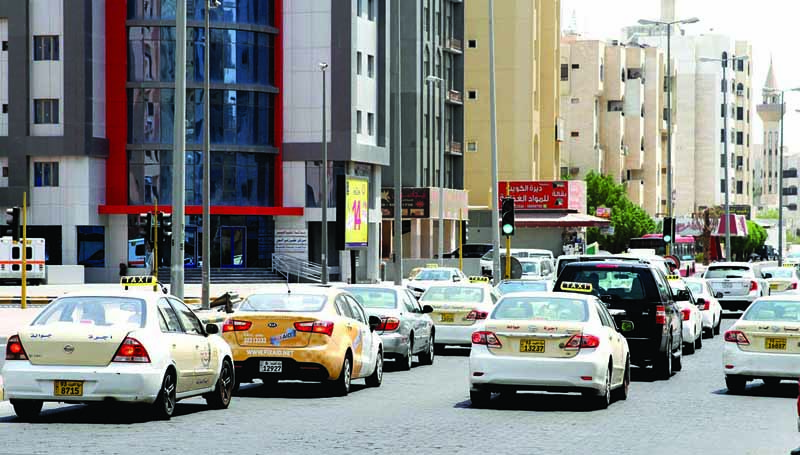 KUWAIT: Taxis stop at a traffic light in Salmiya in this file photo. - Photo by Fouad Al-Shaikh
KUWAIT: Taxis stop at a traffic light in Salmiya in this file photo. - Photo by Fouad Al-ShaikhBy Ben Garcia
KUWAIT: Several taxi drivers in Kuwait are yet to recover from a hiatus of almost five months without work last year due to the coronavirus pandemic. The government banned taxis from operating from March to July 2020 to stop the spread of COVID-19 in the country during the early months of pandemic.
According to some taxi drivers, they can barely make ends meet even now. Their everyday challenge is how to find passengers. Most passengers using the services of taxis are expats; but Kuwait reported the exodus of more than 134,000 expatriates last year amid coronavirus-related restrictions, reducing the total number of foreigners in the country by 4 percent to reach 3.2 million, based on official figures from Jan to Dec 2020 as per the Public Authority for Civil Information.
"We are trying to survive like many others. We are doing our job daily, and thankfully I can still pay the house rent and eat," said Safi, a Bangladeshi taxi driver for over 10 years in Kuwait. "In this time of the pandemic, to survive is the best gift and a big favor from Allah. We just need to work hard and do what is right. At least I can still send some money to my family in Bangladesh, not as much as before COVID, but at least we can survive," he said.
Safi complained of low passenger numbers, since many are still hesitant to venture out. "We are still at war with COVID-19. Before I used to have regular passengers, who vanished, maybe because they are no longer employed, while others left the country," he assumed. "Before COVID, aside from my regular monthly transport of workers, I had regular student passengers. Now all of them are gone," Safi rued.
Some taxi drivers are now delivering food or groceries. "If you are not working hard enough, you won't get anything," said James, a Filipino taxi driver since 2016. To earn a regular income, he offered his services to become a 'marketer' and deliver products to the doorsteps of his customers. "I buy whatever they need from the market. I am paid to buy their groceries plus get a delivery charge depending on the distance," he said.
Glenn, another cabbie, carries an icebox with multivitamins and food supplements to sell to passengers. "If we don't go the extra mile to add to our daily income, we will end up destitute. As long as I am earning extra legally, it won't hurt me," he said. Glenn also helps sell houses back in the Philippines through a real estate office here in Kuwait in exchange for a commission of 2 percent. "People who are buying homes now in the Philippines are mostly housemaids, as real estate developers are selling their properties at low prices," he said.
Asked about the challenges taxi drivers face daily, Glenn said picking up random passengers and interacting with them is a huge challenge, but they risk their lives for their families. "We fight daily for our families and our survival, sad to say," he said. "Besides, there are some customers who do not wear masks."










